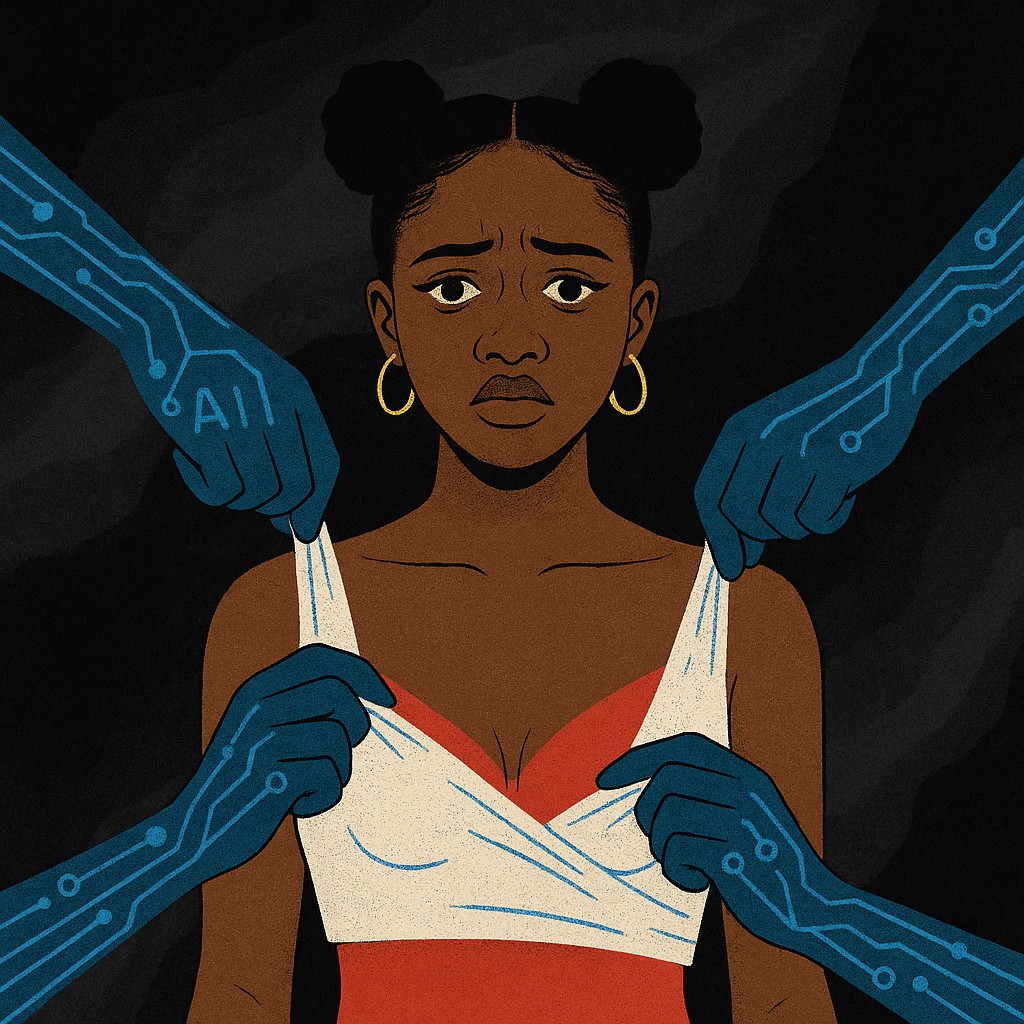
Exposed by AI When Technology Crosses the Line: The Dark Side of Technology and the Ayra Starr “Undressing” Scandal
What began as a celebration of female talent has quickly turned into a cautionary tale about the dangers of AI misuse. Nigerian Afropop sensation Ayra Starr is the latest victim of digital exploitation after images of her were allegedly altered using artificial intelligence to depict her nude without her consent.
The perpetrators? A segment of Twitter/X users, many of whom either shared, endorsed, or passively allowed the manipulated content to go viral.
This isn’t just about a celebrity. It’s about the growing crisis of digital dignity in the age of AI. And it demands a national and global conversation.
What Really Happened?

According to multiple online reports, AI-based deepfake tools were used to generate manipulated, hyper-realistic nude images of Ayra Starr images that falsely depicted her in compromising positions or attire.
What makes this especially sinister is that no one had to “hack” anything. All they needed was a clear photo and a free AI nudifying app widely available on the internet. Within minutes, the damage was done.
These images were then circulated on Twitter/X, mostly by troll accounts, meme pages, and so-called “incel” groups, many of whom justified their actions as “jokes,” “fan art,” or “what-if fantasies.”
But to Ayra Starr and millions of women watching, there’s nothing funny about being virtually stripped and served to the internet.
Violation Beyond the Flesh: Digital Nudity Is Still Sexual Harassment
Let’s be clear: using AI to simulate someone’s nudity without consent is a form of sexual abuse — even if no real clothing was removed and no physical contact occurred.
It weaponizes technology to reduce a woman’s image to a sexual object, strips her of agency, and opens the door to emotional trauma, slut-shaming, and reputational damage.
In Ayra Starr’s case, this is compounded by the fact that she is a young, rising artist — a role model to many — whose brand is built on both musical talent and personal identity. This attack isn’t just about her body. It’s about her career, autonomy, and safety.
Twitter’s Role: Platform or Playground for Abuse?
While Twitter/X under Elon Musk has promised to uphold free speech, critics argue that the platform has become increasingly hostile toward women, especially Black women and celebrities.
Why wasn’t the content removed immediately?
Why are accounts that post such material still active?
The platform’s inability or refusal to police deepfake pornography and AI nudity is no longer just an oversight. It’s complicity.
And as long as Twitter continues to profit from engagement, clicks, and ad revenue tied to such posts, it will always have a financial incentive to let the abuse slide.
The Rise of “AI Porn” Culture
This is not an isolated incident. What happened to Ayra Starr is happening to women around the world influencers, journalists, YouTubers, and even underage girls have reported similar digital assaults.
Apps that promise to “remove clothes from any photo” or “make anyone nude with AI” are openly promoted on Reddit, Telegram, and dark corners of Twitter. And their targets are almost always female.
This is digital misogyny 2.0 and the law has yet to catch up.
Nigerian Law and Online Sexual Exploitation: A Gap Wide Enough to Bury Victims
In Nigeria, the Cybercrimes Act (2015) and VAPP Act (Violence Against Persons Prohibition) offer some legal protections against online abuse, but there is no specific law addressing AI-generated nudity or deepfakes.
This means that Ayra Starr and others like her may have no clear legal recourse.
That’s a dangerous gap.
If the law can’t protect our women from digital assault, and platforms won’t act unless there’s public outcry, then we are normalizing virtual violence under the guise of “tech innovation.”
What’s at Stake? More Than Just Ayra Starr
This is not just about defending Ayra Starr although she deserves every ounce of protection, support, and justice.
This is about setting the tone for how we engage with emerging technologies, how we protect digital identities, and how we defend the integrity of public figures who are increasingly targeted simply for being visible, confident, and female.
If society stays silent, we create a world where AI doesn’t empower us it undresses us.
ALSO READ
Why Everyone Wants to Be a Content Creator
Kizz Daniel’s Confession Unmasks the Pressure of Fame
What Needs to Happen Next
1. Immediate Policy Reforms on Social Media Platforms
Twitter/X must ban all forms of AI-generated nudity, including deepfakes and manipulated media with automatic takedowns and account suspensions.
2. Digital Harassment Laws Must Evolve
Nigeria’s National Assembly must update the Cybercrimes and VAPP Acts to include AI-generated sexual content as a punishable offense.
3. Public Figures Need Safe Reporting Channels
Celebrities, influencers, and private citizens should have access to rapid-response legal aid and tech support when their images are weaponized.
4. Education on AI Ethics
Nigerians especially youth must be educated about the ethical boundaries of AI and the human cost of “harmless” online behavior.
WhatsnextNG Conclusion: We Can’t Let Silence Normalize This
Ayra Starr’s story is a terrifying reminder of what happens when technology outpaces morality. This isn’t about music, fame, or trolling. It’s about consent, dignity, and justice in the age of artificial intelligence.
This article exposes a disturbing incident where Twitter users allegedly used AI tools to digitally undress Nigerian singer Ayra Starr, spreading fake nude images of her online. It explores how such actions represent a new form of digital sexual abuse, raising deep concerns about technology misuse, online consent, and the failure of platforms like Twitter/X to protect victims.
The piece criticizes Twitter’s inaction, highlights the lack of Nigerian laws addressing AI-generated pornography, and warns that this trend is part of a growing global culture of tech-enabled misogyny. It argues that what happened to Ayra Starr is not just an attack on a celebrity but a broader threat to digital safety, especially for women.
The article calls for urgent updates to cybercrime laws, stronger platform policies, and public education on AI ethics to prevent future abuses. It ends with a strong message: we must not normalize AI-driven exploitation or let silence become complicity.
Every Nigerian from policymakers to parents, influencers to fans must stand up now. Because if we let this go unchecked, no woman’s image is safe, and no person’s digital identity is sacred.
The future must be built with consent not clicks.






